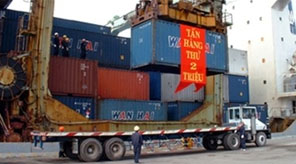EU-Vietnam FTA: opportunities and challenges
A Free Trade Agreement (FTA) between Vietnam and the EU is expected to offer many new opportunities, but also pose challenges for Vietnam’s economy.
Reductions on tax rates for most of the products under the FTA framework will give Vietnam an advantage over its rivals in the EU markets.

At present, the EU is imposing high taxes on Vietnam’s main exports to the market, including footwear (12.4 percent), textiles and garments (11.7 percent), and seafood (10.8 percent).
According to a recent Vietnam-EU Mutrap study, the FTA will increase the export volume of major Vietnamese products to the EU by 10-20 percent.
Nguyen Ton Quyen, Secretary General of the Vietnam Timber and Forest Product Association (Vifores), says as the FTA will also stabilize tax rates for Vietnamese wood products and slightly increase the import volume.
However, after the agreement is signed the Vietnamese busineeses will face certain challenges. At a recent seminar on “Vietnam – EU Free Trade Agreement Negotiations: Opportunities and Challenges for Vietnam FDI businesses”, former Trade Minister Truong Dinh Tuyen warned both sides of difficulties that may arise thereafter.
He cited technical barriers related to epidemiology and hygiene as well as animal and plant quarantines as challenges for Vietnamese goods entering the EU market.
Le Van Dao, Vice President of the Vietnam Textile and Apparel Association (VITAS), said declaring product origins will be another obstacle for Vietnamese businesses.
The EU presents the biggest challenges but the development gap between both sides and the competition pressure placed on Vietnamese enterprises are also significant factors.
To coincide with the EU’s tax reduction move, Vietnam will also have to cut taxes on imported goods. How Vietnamese businesses can survive and compete with similar items imported from the EU, even on their own turf, remains an open question.
Lessons learnt from joining the WTO in 2007 have shown that increasing pressure from the outside will help Vietnam improve its economy. Competition with strong foreign businesses will push local enterprises to either restructure themselves, or fall apart.
Professor Tran Van Tho from Waseda University warned of a “free trade trap”, saying that removing taxes and non-tax barriers when local industries are not strong enough will slow down the shift in the industrial structure in less-developed countries.
Taking advantage of new opportunities arising from the EU FTA, therefore, requires appropriate adjustment in business operations as well as formulation of a solid macro strategy.
(VOVNEWS)

